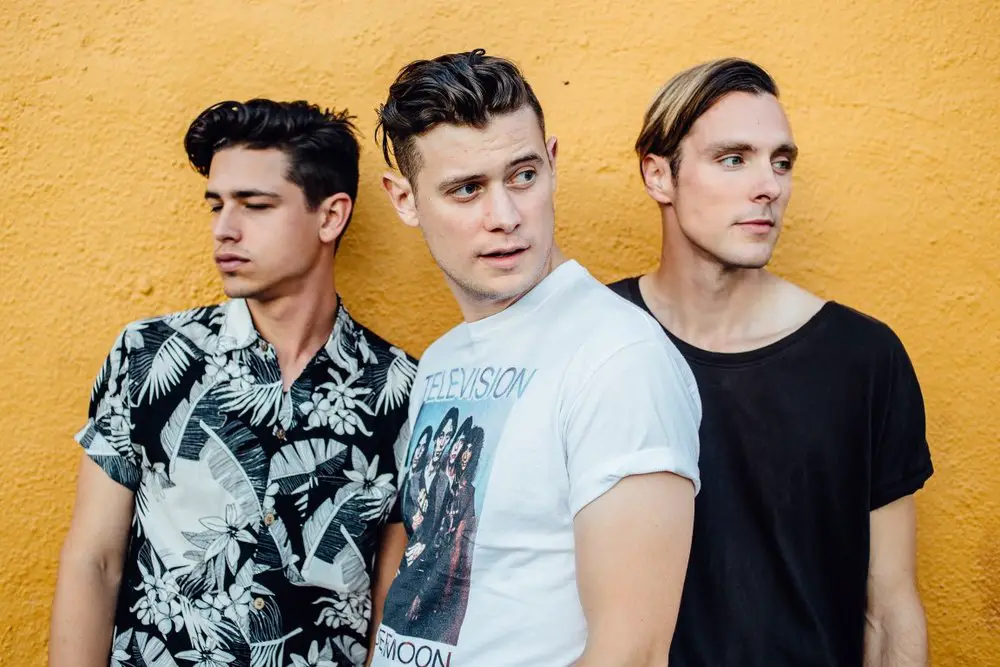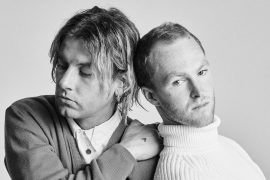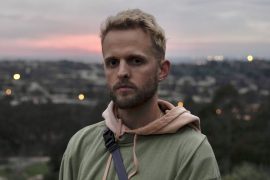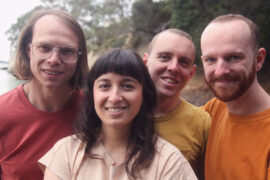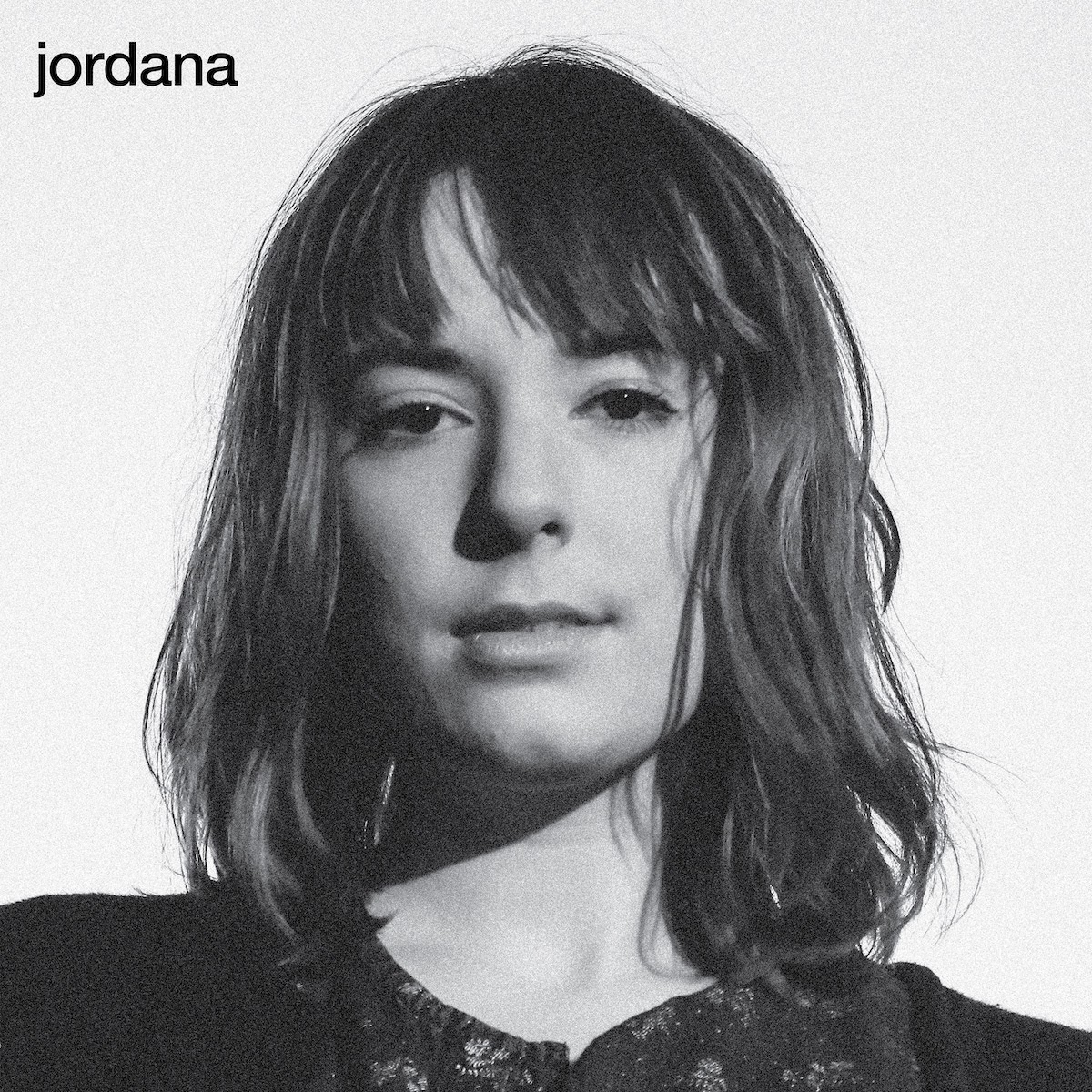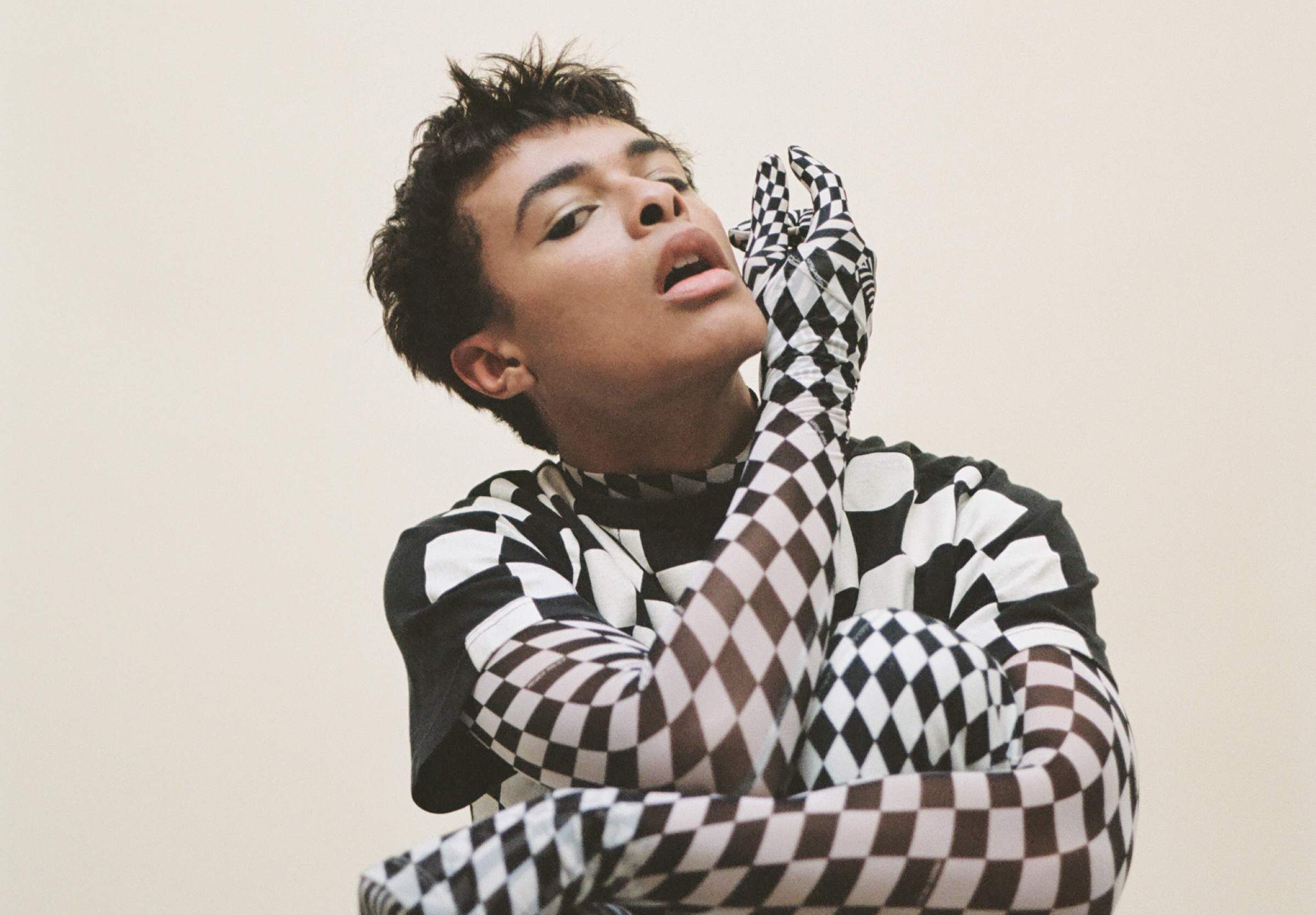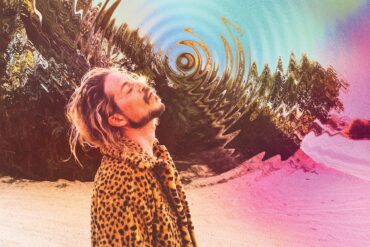Dreamers, music makers, thinkers, envisioners: This is the epitome of Nick Wold, Marc Nelson, and Jacob Wick’s idyllic lifestyle. The trio, better known as alt-rock juggernauts DREAMERS, have decidedly blown up within their genre, finding their music placed on regular radio rotation across the nation, as well as racking up an millions of online streams on not just one, but four of their songs: “Sweet Disaster,” “Painkiller,” “DRUGS,” and “Wolves.”
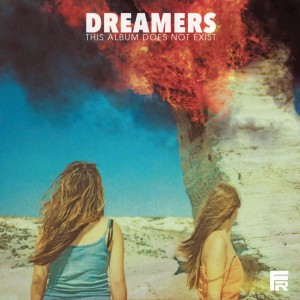
“…Now it feels like, we may have […] proven ourselves,” Wick, the band’s drummer, says about the effects of their radio success.
DREAMERS, currently based out of L.A., only just released their debut record, This Album Does Not Exist (Fairfax Recordings/Universal Music), in August of 2016. Their passion and drive for what they do is tangibly evident, as they continuously craft infectious hooks and belt-worthy lyrics. They remain a tight unit in their musical creation, and the band’s synergy translates not only through their music, but in their charming personalities as well. It’s been an admittedly short and wild ride for DREAMERS, but they’re loving every second of it.
“…This band is an adventure. Personally, this feels like a huge adventure. We haven’t been a band that long!” Bassist Marc Nelson remarks.
Watch: “Sweet Disaster” – DREAMERS
A CONVERSATION WITH DREAMERS
Atwood Magazine: The debut album - I love it. It’s very high energy, there’s a lot of dynamic sounds to it, both for vocals and instruments; what was the process of creating it, and picking the songs you were going to use?
Nick Wold: It was kind of a long process; we’ve been playing music all our lives, which kind of led us here. And I’ve been writing a ton of music by myself, and then eventually we put some stuff together. This album was kind of the collision of that process, with us signing a record deal in L.A., and moving to L.A., and then recording in Sound City, which is this amazing studio where some of our favorite records have been made.
Cool! And you mentioned moving from New York to California - how do those places both influence the music? Are they different in terms of their influences?
Nick: Yeah, they’re very different, different places to live. In New York, I was living in my practice space for the last like, year and a half before we started going on tour, and it was very rough-and-tumble. It was too expensive to work a job and be in a band full-time. So, yeah, it just kind of started that way. L.A. is much more spacious and sunny. It’s nice. It’s a good sort of haven for us to come to after tour. Get some sun, get some chill quietness.
Do you like the beach? Are you beach people?
Nick: Yeah it’s great. Actually, I’ve sort of been in L.A., but never go to the beach. There’s no time. But I do love the beach.
Jacob Wick: Yeah, I haven’t been to the beach since we filmed that thing – the “Sweet Disaster” thing.
Marc Nelson: When we first moved, I got picked up at the airport by a friend who surfs. And I went right from the airport – I flew in from New York, and went right to the beach and went surfing for the first time. That’s the only time I’ve been to the beach.
Immediately, as soon as you got there?!
Nelson: Yeah, it was like, no sleep, and it was my first time trying it, which was amazing. But yeah, I haven’t been back to the beach, and that was what, a year and a half ago?
Nick: Also, the first time we listened to the album after it was mixed, I was with our producer, and we listened [to it] on the beach in Malibu.
Do you think you have certain songs that are more influenced by California, and songs that are more influenced by New York? Or is it kind of a blend?
Nick: It’s all a blend. It’s such a weird blend, because we travel all the time. We’re almost never in L.A. Yeah, I definitely know the two of us [Nelson] definitely have New York in our souls. And now we have L.A., so it’s hard to tell.
Jacob: I never lived in New York; I lived in California my whole life.
L.A. area, or have you moved around?
Jacob: Central coast is where I grew up, three hours north of Los Angeles; I’ve been in L.A. for 3 years now.
Nick: I think the locale does definitely influence the writing, but it’s hard to say how it does. I’ve noticed a lot more lyrics about California, but we never tried to.
I mean, it’s whatever is inspiring in the moment!
Nelson: And the album is really kind of all upbeat. There’s a difference — New York tends to be a little rawer and darker, just inherently. L.A. is the kind of place where you can be fifteen minutes late to anything, and just be like, “Oh yeah, I was on the 101,” and everyone will be like, “Oh yeah, I feel that.” And in New York, you feel like you’re always running late.
Yeah, everyone’s always going. I got a similar response when I interviewed Jordan from Mainland, and he said the same thing; it’s very polar opposite.
Nick: We love Mainland, now they’ve come and joined us in L.A. We used to hang out in New York. We came there first, but they’re actually from California. But we were all New Yorkers together, and then we moved to L.A.
Nelson: New York must be something wrong, because everybody’s fleeing it.
Nick: It’s an exodus.
It’s too expensive!
Nelson: I love New York City, but, yeah.
Nick: Yeah, I love it too, but it’s too expensive, and it’s just not as good of an environment for making music, I don’t think. Not right now.
Jacob: It’s nice to visit.
The most tangible effect, honestly, from the radio play, is that people know the words now.
I agree. And 'Sweet Disaster' has kind of blown up now - but a similar thing happened with some of your other songs, with 'Wolves' and 'DRUGS,' they’ve all kind of gotten a lot of airplay. Have you noticed a difference in the way that you’re perceived in the industry, because you have more success now?
Nick: Oh yeah, definitely. You know, everybody grovels at our feet now.
Nelson: It’s true. I don’t even have to put on my own shoes anymore.
Wow, Cinderella! Amazing.
Nick: Yeah no, but we definitely notice a difference like, in the beginning you’re beating your head against the wall trying to get people to listen to you, and now it’s like, here, we wrote a song…
Jacob: People were skeptical in the beginning. Like, “Who are you?“
Nick: Like, “Oh great, you’re in a band, yeah, right.”
Jacob: “Prove yourself.” And now it feels like, we may have done that for some people — proven ourselves.
Nick: Now, people believe us when we say we’re in a band.
Nelson: The most tangible effect, honestly, from the radio play, is that people know the words now. We’ll go to shows, and everybody will be singing. And like, album songs — they know the album! That feels really good.
It’s like a gateway into the rest of it.
Nelson: It makes being on stage — because we used to battle it out for a long time, especially in New York — worth it.
Nick: Yeah, it sucks when you’re playing a song, and nobody else really seems like they want to hear it, or even know it. Music is really all about the group experience, so when everybody like, knows the music, it’s a totally different game.
Nelson: It feels nice.
Listen: “Wolves” – DREAMERS
[soundcloud url=”https://api.soundcloud.com/tracks/156933417″ params=”auto_play=false&hide_related=false&show_comments=true&show_user=true&show_reposts=false&visual=true” width=”100%” height=”150″ iframe=”true” /]
So do you think that success can be measured, then, based on your experience, or do you think that there is a certain way to be successful?
Nick: I think that it can be measured imperfectly, kind of like health. There is such a thing as health, but there is no meter for exactly how.
Jacob: Yeah, you can be the healthiest person and still get cancer.
Nick: There’s no one way to be healthy; there’s many different possible ways to do it. So like, success, I think you define your own success.
Nelson: Success, and this is kind of a cliche, but it’s kind of like, just a state of mind anyway. You can’t say what somebody thinks of success.
Jacob: Yeah, it depends on somebody’s definition of success.
So it is subjective.
Jacob: Personally, I have a very different checklist of success compared to someone else in music.
Nick: My goal today was to get out of bed and eat a sandwich, and I’m very successful.
So what has been a major motivator for you, in terms of making music?
Nick: A lust for life, the need to just kind of dream and think discover creatively, things like that. And rather than wanting to be stuck in an office or something.
Is that why the name is DREAMERS?
Jacob: Yeah.
Nick: Dreamers, music makers, thinkers, envisioners.
Is that the full band name, but it just didn’t fit on the record?
Nick: Yeah exactly. But that’s just what we aspire to be. I don’t want to be speaking for everyone – is that accurate?
Jacob: Absolutely.
Nelson: Totally.
Cool. So your name is DREAMERS - what is the weirdest, or the best (or both) dream that you’ve had, or can think of?
Nick: Whoa. The weirdest dream – it’s hard to say. It’s like saying, “What’s the sweetest Starburst you’ve ever had?” They’re all very sweet.
Nelson: Except for the yellow ones.
Nick: Yeah I don’t know, I’ve had so many dreams that were so profoundly moving. I remember I had this one dream where I was just like, sitting on this high, high place atop the world, where I could see out to this great big landscape, and the sun was setting, next to me was a woman, and the other side of me was John Lennon. And we were just chilling.
Wow, he’s third wheeling hard!
Nick: Yeah, John Lennon was third wheeling me!
Jacob: That’s like The Lion King – “Anywhere the light does not touch, you may not go!”
Nelson: And then it got weird.
And then Mufasa showed up.
Nick: Yeah, no, I just sort of woke up feeling like, “Wow, that was a heavenly, peaceful experience.” And there was John Lennon!
That’s cool!
Nick: But it was a dream! Dreams are just so weird.
Jacob: You know, I had the same thing, but with Paul! It was weird.
Nelson: I’ve never had a Beatle in my dream. Never!
Jacob: Really? You know, I had this one dream where I really and truly felt like I’d met all of them.
[At this point, Danny Duque-Perez from The Griswolds approached, briefly interrupting our interview. Not that we minded much.]
So your song 'DRUGS' kind of focuses a little but Millennial culture and the Internet Age. What is your “drug” of choice - in relation to the song?
Nick: Right, that song is about our addiction to technology, to our phones. We get nervous. When you get bored, what do you do? You grab your phone. You reach to it. And it changes our lives in certain ways, some for the better, some for the worse.
I like to just try […] to live moments as if they’re adventures again, because they can be.
So is your phone your drug of choice?
Nick: I don’t think I chose it, I think it chose me. I was watching the Oasis documentary recently, and was getting really nostalgic. I love the 90s, I love 90s music; but I was just like, wow, look at the ways in which people acted differently back then. Now, everything is online, and everything is broadcast. People are very kind of safe and careful now. And then like, a concert was a crazy adventure that people went on. There’s a part in this documentary where Noel [Gallagher] from Oasis gets pissed off at the band, and he leaves and goes to San Francisco, and they’re like, “Oh my god, we can’t find Noel, where is he? He’s gone.” And he came back after a few days, but just the notion that you can go somewhere, and no one would nowhere you are, and you’re just there — you can’t do that anymore.
Well, you could, but then people get more concerned.
Nelson: Somebody would just tweet, “Noel’s right here, I just saw him. I just saw him go into a fucking Starbucks – he’s here.”
Nick: Yeah, like, you go on Facebook, and people just geolocate you. I don’t know. I like to just be aware of that, in small doses. In small ways, I like to just try and kind of remember that, and try to live moments as if they’re adventures again, because they can be.
Listen: “DRUGS” – DREAMERS
[soundcloud url=”https://api.soundcloud.com/tracks/244125606″ params=”auto_play=false&hide_related=false&show_comments=true&show_user=true&show_reposts=false&visual=true” width=”100%” height=”150″ iframe=”true” /]
What’s the best adventure you’ve been on?
Nelson: The obvious one – this band is an adventure. Personally, this feels like a huge adventure. We haven’t been a band that long!
Jacob: My one adventure is this life, and it’s been pretty good. It’s been pretty adventurous.
Nick: We went on a pretty cool adventure in New Mexico, too. We went to the top of a cliff in the middle of the desert, and we watched the sun go down.
That’s a pretty cool adventure. What’s one thing people don’t know about you, that people may or may not want to know?
Nick: Everything about me is online.
Nelson: It’s true.
Nick: I don’t know.
Nelson: It’s hard, because people know so much; we give so much of ourselves away.
Is there anything you want people to know about you?
Nick: Yes. I have two spirit animals: the whale, and the crow.
How do they go together?
Nick: The whale is my main spirit animal. It’s big and peaceful; it sings; it’s mystical; it’s smart. The crow is sort of like my dark side. It’s clever; it’s dark; there’s a lot of crows where I grew up in Seattle; it’s mischievous.
Are you mischievous?
Nick: Yes.
Nelson: I’ll give mine; I have two spirit animals: the wolf and the owl. I don’t really know what it means. Some hippie girl told me my spirit animal was a wolf a festival once, just randomly, and then I think one of those online quizzes said it was the owl. So I don’t know what they mean, I just know that’s what they are.
So you both have one flying, and one non-flying animal.
Nelson: One heavenly, one temporal.
Do you know your spirit animal, Jacob?
Nick: Yours is the cobra and the tapeworm.
Jacob: Yeah. No limbs.
But why the tapeworm?
Nick: No, he’s the Camel — but not the animal, the cigarette.
…With music, you can get away with saying things that you usually can’t say.
Sure. So how do you hope to keep pushing yourself in the “indie” music scene, or do you think that “indie” itself is still in existence, or do you think it’s kind of dying off?
Nick: I think that word is dying off, but I think the thing that it is, is the same as it always was. I don’t know. It used to be called rock n’ roll; it used to be called grunge, or something; it used to be called indie. I don’t know what we are out of that, but we’re some kind of mix of all the stuff that we like. But, yeah, we love working hard. We work nonstop; we don’t take days off, at the goal of creating awesome stuff, and trying to write and expand and think and do. That’s it, that’s the plan.
Cool. And my last question for you, then, is why does music matter to you, and what’s your favorite part about making music?
Nick: I remember deciding when I was young that music can matter immensely and massively. I remember going to a huge concert at The Gorge in Washington State, and how uniquely human it is that all of these people came there, for no reason, and there’s just thousands and thousands of people all there, united, making a massive sound up toward the stars. And that’s just a very human thing that, for some reason, I’ve always felt the need to do, that transcends like, just regular necessity and trying to like, make food or shelter and stuff like that. It’s like us transcending that, and just doing something great, and doing something loud, and acknowledging our existence. That’s why it’s important. And, also, because it can change the culture.
Jacob: It’s also therapeutic, and a way of communication, a way of presenting an idea that could be more extravagant.
Nick: It could be entertainment, it could be art, it could be therapy.
Jacob: Yeah, I feel like with music, you can get away with saying things that you usually can’t say. Or you have a platform where someone will give you a chance to say something that they usually wouldn’t let you say just in conversation.
Nick: Yeah, for some reason, music has immense power. It’s like, we’re tapping into this thing, music, that’s been around forever, and you can learn how to kind of channel some of it. But for some reason, it just has this huge power. It’s really powerful emotionally, it can spread ideas, it can inspire; I don’t know, it’s a weird, mystical thing that’s hard to explain.
Nelson: I was going to say, that’s kind of the most rewarding part of the whole process, in a weird way. It’s like, a song starts really personal and private, and then it just kind of builds out, you know? There’s a diffusion of ownership that just keeps going out, and then people hear it, and it’s very quickly a song that started from a private, personal place, that takes on a life of its own. That’s the most rewarding part, when you see that. All of a sudden, something that started very private becomes more of a social phenomenon — even if it’s just one person listening to it and loving it. The most rewarding part is kind of just watching something spread, and blossom. And it might mean different things to different people, but it’s really amazing.
Nick: Or, maybe it’s just a big, elaborate mating call.
Nelson: That’s true, too.
It can be all of the above!
Nelson: It’s a noble pursuit, honestly. People are too uptight. Just have some fun.
DREAMERS are acutely aware of their growth and higher platform, and recognize that the industry in which they exist is often merciless. With summer on its way, the trio will be hitting the festival circuit, continually growing their fan base. There are no days off for DREAMERS – every little thing counts. They do not let this craziness affect them, however, and simply want to enjoy this crazy ride they’ve gotten on.
As Nick mentioned, the group’s primary goal is to continue creating awesome stuff, and “trying to write and expand and think and do.”
And the dreams just keep getting bigger.
— — — —
![]()

